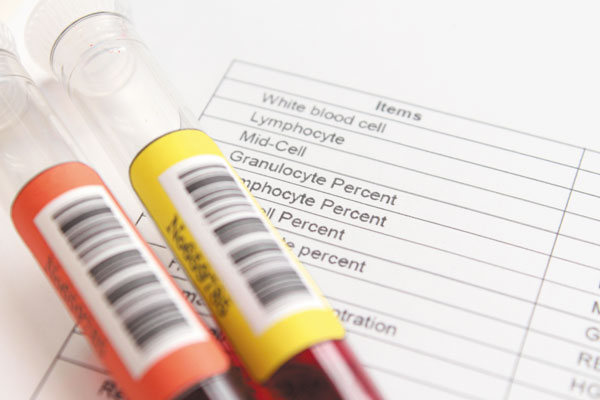Source : Thailand Medical News Dec 30, 2019 5 years, 3 months, 3 weeks, 6 days, 21 hours, 16 minutes ago
A recent study suggests that some readings from
routine blood tests could help identify people at higher risk of disease and death related to disease. Doctors currently use the readings as markers of immune condition and
inflammation.

The researchers analyzed 12 years of data from 31,178 participants in the National Health and Nutrition Examination Survey (NHANES).
It was found that those with low
levels of lymphocytes, a type of white blood cell, were more likely to die from heart disease, cancer, and respiratory illnesses, such as pneumonia and influenza.
The meta analysis showed that the link between
low lymphocytes a condition called lymphopenia and higher risk of disease and death did not vary with age or other common risk factors.
The predictive power of the
low lymphocyte count increased when the scientists added two other measures of blood abnormality: one relating to inflammation and the other to the ability to maintain a supply of red blood cells.
The study is the work of teams from the University Hospitals Cleveland Medical Center, in Ohio, and other institutions. They report their findings in a recent
JAMA Network Open paper.
Study author Dr Jarrod E. Dalton, Ph.D., who co-led the investigation told
Thailand Medical News, "Scientists have gone to great lengths and expense to develop novel
biomarkers to identify people at the highest risk for death and disease. Here, we have taken a more pragmatic approach of investigating the predictive power of components of a patient's
white blood cell count, which is collected as part of
routine blood work during standard health exams."
Dr Dalton is an epidemiologist at the Cleveland Clinic's Lerner Research Institute.
In the research paper, he and colleagues remark on the increasing availability of drugs that target the immune system to treat established disease. These treatments seek to either reduce or boost immune activity, depending on the underlying relationship to disease.
However, they urge that there is also a great and unmet need for tools and methods to help prevent immune-related diseases in the general population in the first place.
Typically, around 20–40% of white blood cells are lymphocytes. A shortage of lymphocytes leaves the body susceptible to infection.
While medical scientists have recognized that a
low lymphocyte count is a strong risk factor for premature death in people with a particular heart valve condition, there has been little research on its value as a more general predictor of survival.
For the new research, the team wanted to discover whether
lymphocyte counts could be an effective way to assess the risk of disease and disease-related d
eath in a nationally representative adult population.
The researchers performed the analysis with
lymphocyte count on its own, then together with two other markers.
The two additional markers were
red blood cell distribution width (
RDW)
and
C-reactive protein (
CRP)
.
Red blood cell distribution width or
RDW is a measure of how well the body can produce and maintain a healthy supply of red blood cells.
CRP is a marker of inflammation.
The study analysis linked
low lymphocyte count with reduced survival both on its own and in conjunction with other blood markers, especially
RDW and
CRP.
Based on the study findings, the researchers conclude that around 20% of the general adult population of the United States appear to have a high risk profile, according to these markers.
Furthermore, they calculated that the chance of dying within the next 10 years for those with the highest risk profiles was 28%, compared with only 4% for those with the lowest risk profiles.
The study team suggests that with more research, it should soon be possible to understand the biological nature of the relationship between these markers and disease. Such knowledge could help identify suitable treatment targets. Meanwhile, it should be possible to help doctors use the markers to identify those with the highest risk of premature death as part of routine preventive care and screening.
Reference : Association of Lymphopenia With Risk of Mortality Among Adults in the US General Population, David A. Zidar, MD, PhD; Sadeer G. Al-Kindi, MD; Yongmei Liu, MD, PhD; et alNikolas I. Krieger, MS; Adam T. Perzynski, PhD; Michael Osnard, MD; Christopher Nmai, BA; Donald D. Anthony, MD; Michael M. Lederman, MD; Michael L. Freeman, PhD; Robert A. Bonomo, MD; Daniel I. Simon, MD; Jarrod E. Dalton, PhD
JAMA Netw Open. 2019;2(12):e1916526. doi:10.1001/jamanetworkopen.2019.16526
